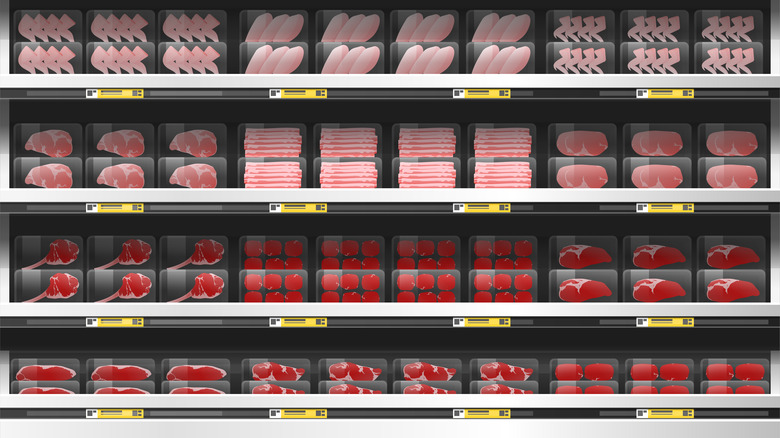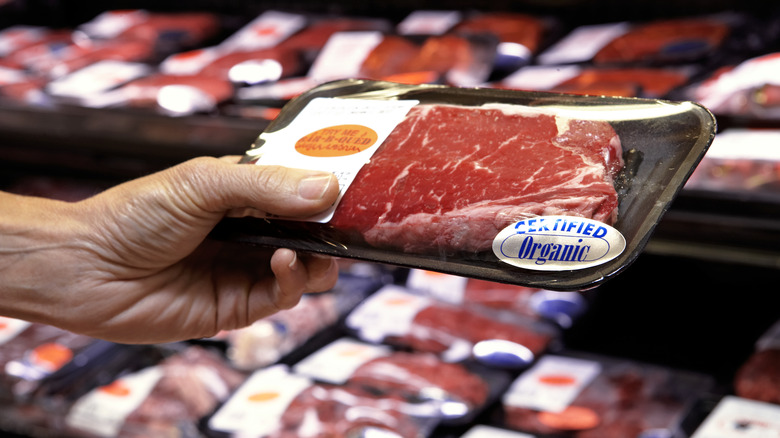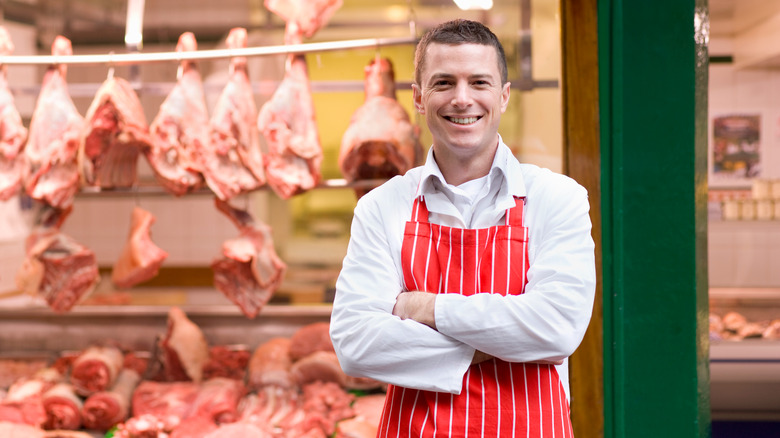Why Professional Chefs Avoid Buying Meat On Sale
It should come as no surprise that, for most of us, meat makes up a pretty big chunk of our diet. We eat bacon and sausage in the morning, a hamburger or McNuggets from McDonald's for lunch, and pork chops or pot roast for dinner — and that's not including the wide variety of poultry and fish we eat. It would stand to reason that, whenever possible, we keep a steady supply of meat in our homes, such as lunch meat to cuts of beef.
Many professional chefs have taken it upon themselves to act as guides to the wonderful world of meat and meat products, whether it's tips on how to best prepare your meat through grilling, roasting, or frying or even giving tips on what to look for when you're buying meat. Celebrity chefs such as Wolfgang Puck and Charlie Palmer, for example, recommend ensuring that your meat is not only given a full bath in brine but allowed to rest for at least ten minutes before grilling (via RealSimple). Similarly, Paula Deen also advises you that, when frying chicken, you keep in mind that white and dark meats have different frying times and you should keep an eye on them so neither gets overcooked.
These are only a few of the many examples of the tips chefs have to master your meat. Another piece of advice warns against giving into impulse and getting that cheap, discounted meat.
You may not be too sure how fresh that meat is
When you're in the meat aisle of your local grocer and you see a section of meats that have been marked down as discount, you probably want to stock up. Chicken breasts for 30% off? Ground beef now only a dollar a pound? With these prices, you think, I'd be crazy not to get them! But some chefs caution against those discounted meats, as they may not be as appealing as they seem.
"Some things I don't want to tempt fate with," says Leonard Botello IV of Truth BBQ (via Food and Wine). "One is meat that's been marked down to make room for new inventory. That's a huge no-no for me." Botello explains that he feels that way regarding discounted meats and "pre-made" meats like stuffed chicken. The reason, Botello says, is because he's unsure of just how long those items have been sitting out on display. After all, if they're being knocked down for a discount, it may be because they've been sitting there for quite some time.
Even the legendary late Anthony Bourdain warned about this sort of trick back in 1999 during his stay at The New Yorker. In his piece, Bourdain claims that, if you were to purchase a fish dinner for a low price at even a swanky New York restaurant, chances are you're eating four-day-old fish the chef just wanted to move for new inventory.
Get to know your butcher
Now, you may find yourself in a bit of a pickle: You don't want to burn a hole in your wallet buying meat, but you also don't want to risk getting some dubious meat for really cheap. How can you get meat for a cheap price and still be assured of its quality?
The Local Profile asked chef Chris Vogeli his opinions on how to pick the best cut of meat, and one of his pieces of advice was simple: Get to know your butcher. By talking to your butcher, Vogeli explains, you get a little more information about the meat they're selling. You'll know how fresh the meat is, when the meat came in, how it's graded, and so on. If your butcher is trustworthy and knowledgeable, you'll walk away with not only plenty of confidence in what you've purchased, but you may also make a new friend too. If your butcher may not seem all too sure about the meat themselves, that's a strong red flag.
Escoffier Online also strongly recommends getting to know your local butcher, noting they can not only give you information on what they sell, but they can also help you choose what kind of meat you'll need for your specific purposes. Their jobs literally revolve around different cuts of meat, so they'll probably be more than happy to give you advice or helpful suggestions if you ask. Just don't go getting into any beef with them, okay?


